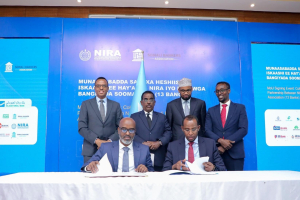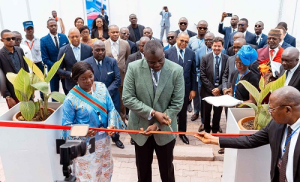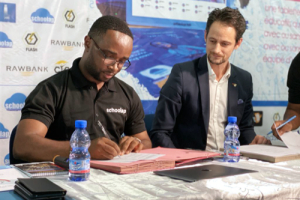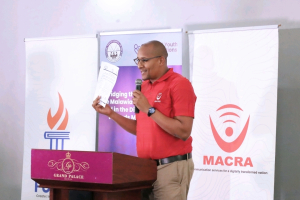Somalia Launches Digital ID System to Enhance Financial Inclusion
In a continent where access to formal banking services remains limited for many, providing citizens with unique digital identities can facilitate easier access to banking services and improve the efficiency of financial transactions, contributing to economic stability and growth.
Somalia has launched a digital identification system to advance digitalization and financial inclusion. To formalize this initiative, the National Identification and Registration Authority (NIRA) and the Somali Banking Association signed a Memorandum of Understanding (MoU), on August 25, at an event in Mogadishu. The event gathered several government officials.
“We have signed a Collaborative Partnership with 13 Somali banks, creating a vital link between Identity Certificates and banking services,” NIRA Director General Abdiweli Timacade revealed in a post on his X account.
The initiative, Developed by the Central Bank of Somalia in partnership with the World Bank, provides citizens with unique identification numbers to facilitate easier access to financial services.
The system is particularly significant for Somalia, where many people have historically been excluded from formal banking. The United Nations Industrial Development Organization (UNIDO) highlights in its 2020 ‘Somalia Financial Sector Technical Report’ that only about 15 percent of Somalia's population has a bank account, and fewer than 5 percent of these account holders actively use their accounts. This low active usage rate underscores the urgent need for Somalia's new digital identification system. The initiative aims to enhance access to financial services and promote greater participation, potentially increasing the number of active users and improving overall financial inclusion in the country.
It is expected to enhance the security and efficiency of financial transactions, reduce fraud and money laundering risks, and stimulate economic growth by broadening access to financial services.
Hikmatu Bilali
Starlink to Launch Satellite Internet Services in Ghana by August End
Starlink, the satellite internet service from SpaceX, is set to begin operations in Ghana at the end of August 2024, according to the National Communications Authority.
In a press release published on August 22, the NCA confirmed that Starlink had completed all necessary due diligence, clearing the way for the launch.
Starlink received approval to operate in Ghana in April, following discussions with the NCA, which granted the license after thorough checks.
South African Telecoms Industry Urges Tech Giants to Share Network Costs
Expanding and maintaining robust network infrastructure is essential for improving internet accessibility, supporting economic growth and fostering innovation across Africa. The push for tech companies to contribute to network infrastructure costs is crucial for development, as it addresses the continent's growing digital demand.
South Africa's telecoms industry is urging technology companies to financially support the expansion of network infrastructure. This request was outlined in a report released by the Association of Comms and Technology (ACTforSA) on August 20.
Titled "Promoting Equitable Participation and Sustainable Growth: Exploring Policy, Commercial, Competition, and Socio-Economic Perspectives in South Africa's Over-the-Top (OTT) and Telco Ecosystem," the document argues that tech companies benefit from existing networks without contributing to the associated costs.
"The success of OTT platforms depends on a robust network infrastructure, but they are not currently contributing enough to its upkeep" said Nomvuyiso Batyi, CEO of ACT. "We believe OTTs should contribute to network upgrades and development."
The ACT is pushing for a "fair share" model where over-the-top (OTT) platforms — such as video, audio, and messaging services — would help fund the construction, maintenance and upgrades of the networks they rely on.
According to Statista, the revenue in the OTT video market alone in Africa is forecasted to reach $3.90 billion in 2024, with a compound annual growth rate (CAGR) of 8.30% from 2024 to 2029, leading to a projected market volume of US$5.81bn by 2029. Despite this growth, these platforms currently do not contribute to network infrastructure costs.
As OTT services continue to expand rapidly, their reliance on existing networks intensifies, placing an increasing financial burden on telecom operators responsible of building and maintaining the infrastructure.
Hikmatu Bilali
Nigeria to Begin 90,000 km Fiber-Optic Expansion within 6 Months
Expanding the backbone network positions Nigeria to better integrate into the global digital economy. The increased connectivity will also facilitate access to online education, healthcare and financial services, driving social and economic inclusion across Africa.
Nigeria's Federal Government is set to begin deploying 90,000 kilometers of fiber-optic cable across the country within the next 6 months, according to Dr. Bosun Tijani, Minister of Communications, Innovation and Digital Economy. This expansion aims to increase the nation's backbone network from 35,000 to 125,000 km, significantly enhancing connectivity and improving telecoms services nationwide.
Today, as I reflect on my time in office as Minister of Communications, Innovation & Digital Economy, I am proud of what we have collectively achieved over the last one year in laying a foundation for the growth of our digital economy.
— Dr. 'Bosun Tijani (@bosuntijani) August 21, 2024
The clarity that comes from our Strategic… pic.twitter.com/HZAdsIYZG7
Dr. Tijani disclosed this plan on August 21, while highlighting the Ministry's achievements over 2023. The project, which could start anytime between now and February 2025, is expected to create opportunities by stimulating a more vibrant digital ecosystem, connecting more communities and integrating more Nigerians into the digital economy.
Funding for this project is being finalized with partners to ensure aggregation. The Federal Executive Council (FEC) has approved a Special Purpose Vehicle (SPV) to oversee the project's delivery, the Minister further revealed.
According to Datareportal’s "Digital 2024: Nigeria" of January 2024, Nigeria’s internet penetration rate stood at around 45.5%, with approximately 103 millions internet users. Expanding the fiber-optic network is expected to significantly increase this penetration rate, address connectivity issues and reduce the digital divide, bringing internet access to underserved areas.
Hikmatu Bilali
DR Congo : Raxio Group Launches the Country Largest Data Center
As digital services become increasingly vital for economic activities, the availability of reliable data centres will support the growth of digital economies across Africa. This could foster a more interconnected and robust African digital ecosystem.
Africa’s leading carrier-neutral Tier III data center operator Raxio Group has officially inaugurated in Kinshasa its state-of-the-art data centre, Raxio DRC1, the group announced on August 22. This marks a significant milestone in the Democratic Republic of Congo’s digital transformation.
Hello DRC! Today marks the official inauguration of our Tier III certified data data centre in Kinshasa.
— Raxio Group (@raxio_group) August 22, 2024
Read the full market announcement:
👉🏼 https://t.co/hi7QLwJXh1#RaxioRDC #RaxioGroup pic.twitter.com/BqXGxkw781
This facility representing a $30 million investment has received Tier III accreditation from the Uptime Institute and becomes the country’s largest data center. Located in Limete area, the two-storey Raxio DRC1 spans 1,542 square meters and can accommodate up to 400 racks, delivering 1.5MW of IT power. The data centre is strategically positioned along key fibre routes, offering top-tier colocation and connectivity services, strongly emphasizing sustainability.
Raxio Group’s CEO, Robert Mullins, highlighted the importance of this facility in supporting the DR Congo’s burgeoning digital economy, stating :“With this facility, we are providing the critical infrastructure essential to supporting the digital economy and enhancing connectivity.”
The facility is part of Raxio’s broader strategy to build a pan-African digital backbone, with additional data centrers planned across the continent. The launch of Raxio DRC1 also lines up with the DRC government’s National Digital Plan (Plan National du Numérique), which aims to foster digital inclusion and economic growth through expansive digitalization.
The data centre is expected to play a key role in improving the country’s digital landscape by reducing latency for real-time applications and providing a reliable backbone for mobile and internet connectivity.
Raxio Group continues to expand its footprint with operational facilities in Uganda, Ethiopia, Mozambique, and now the DRC. The company is set to launch new centers in Côte d’Ivoire, Tanzania, and Angola, further solidifying its role in Africa’s digital transformation.
According to the "Africa Data Center Market Size - Industry Report on Share, Growth Trends & Forecasts Analysis Up to 2029" by Mordor Intelligence, the African data center market is projected to grow at a compound annual rate (CAGR) of 12.34% from 2024 to 2029. The increasing digitalization demand for cloud services and expanding data centres across the continent are key drivers of this growth.
Hikmatu Bilali
DRC’s Schoolap Expands into Kenya, Targeting Anglophone Africa
Educational technology company Schoolap, based in the Democratic Republic of Congo, has expanded into Kenya to grow its presence in Anglophone Africa. The move follows its success in Francophone markets, including the Democratic Republic of Congo and Côte d'Ivoire.
The platform, which offers digital curriculum management, interactive learning tools, and performance tracking, aims to address educational gaps and support Kenya's efforts to integrate technology into its education system.
Starlink Launches $15 Monthly Hardware Rental Plan in Kenya
Starlink has introduced a monthly rental option for its hardware kits in Kenya, following the end of a previous limited-time offer. Users can rent the kit for KES 1,950 ($15.06) per month with a one-time activation fee of KES 2,700 ($20.85). This fee is separate from the monthly internet service costs.
Previously, the hardware kit cost KES 89,000 ($687.26), but the price has now dropped to KES 45,500 ($351.35) for outright purchase. The new rental plan aims to make Starlink’s services more accessible.
South Africa: CodeNgwana Brings Coding Skills to Soweto Youth
Coding academy CodeNgwana has partnered with the Matlhogonolo Community Outreach Centre to provide coding and computational thinking skills to 700 young learners in Soweto.
The initiative, launching in September, aligns with the Department of Basic Education’s (DBE) new curriculum, which includes coding and robotics for grades R-9.
CodeNgwana aims to make technology education accessible to all African children. The partnership will offer workshops at the Matlhogonolo Centre, focusing on both student programs and teacher training to ensure effective curriculum delivery.
Egyptian Fintech Startup Lucky Raises $3 Million to Expand Credit Services
Lucky, an Egyptian fintech startup, has secured a US$3 million in a funding round led by Lorax Capital Partners, KEM, DisrupTech Ventures, and other existing investors.
The newly raised funds will be strategically allocated to expand Lucky's credit services, reinforcing its position as a leading consumer credit fintech in Egypt.
Lucky offers financial flexibility and increased spending power through its lending schemes, discounts, and cashbacks.
Malawi to Launch Local Mobile Phones to Bridge Digital Divide
Lack of internet access can be addressed by making mobile phones affordable in African countries. This is crucial for ensuring that all citizens, regardless of their socio-economic status, can participate in the digital economy
The Malawi Communications Regulatory Authority (MACRA) plans to launch a local smart device assembly program aimed at producing affordable mobile phones to bridge the significant digital divide in the country, Director General of MACRA Daud Suleman revealed on August 14. This was during the 3rd session of the National Youths Conversations hosted by the National Youth Council of Malawi (NYCOM) as part of commemoration of the International Youth Day 2024.
The Director General emphasized the importance of a collaborative effort from various stakeholders to enhance digital service access across the nation. “We need a multi-sectoral approach for citizens to have access to digital services at a reasonable distance,” he stated.
According to the Alliance for Affordable Internet (A4AI), cell phones, particularly smartphones, are still inaccessible to low-income populations in Africa. This situation hinders the participation of most of Africa’s population in the digital economy. Without a phone, there is no way to connect to the Internet or use digital services. The price disparity between cell phones and average incomes also exacerbates digital inequalities. People who cannot afford these devices miss out on the benefits of digital technology, including access to information, financial services, online education, and economic opportunities.
While no specific launch date has been provided, the upcoming initiative is expected to address the disparity in digital access.
The initiative aligns with the Malawi 2063 (MW2063) agenda, which seeks to transform Malawi into a prosperous, self-sufficient, and industrialized 'upper-middle-income country' by 2063.
Hikmatu Bilali











